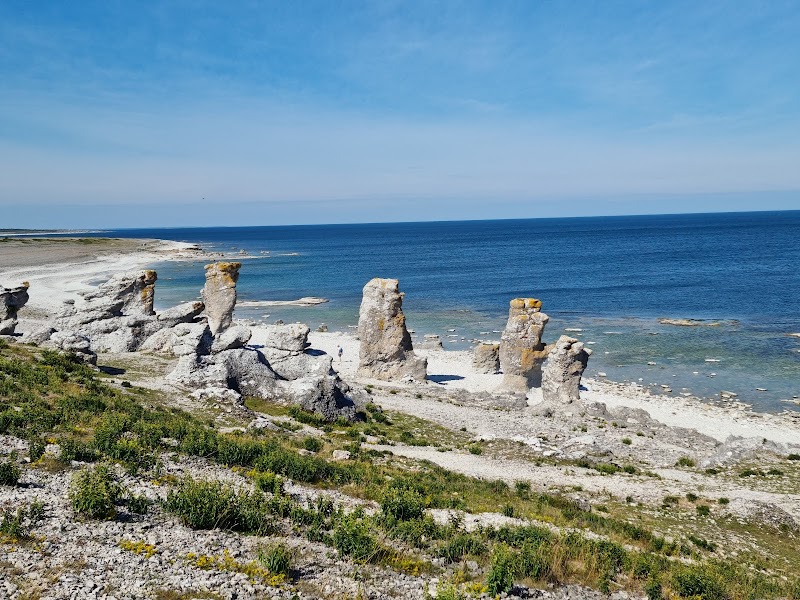
Medieval Week in Visby, Gotland, plunges visitors into a vibrant living history adventure filled with knights, crafts, and ancient city walls. Explore cobbled streets, engage in authentic medieval events, and experience a unique fusion of culture and outdoor energy that invites every adventurer to step into the past.
Wear Non-Slip Footwear
Visby’s cobblestone streets and uneven surfaces require sturdy shoes with good grip to navigate safely, especially during evening events when stones can be slick.
Stay Hydrated Throughout the Day
The combination of active events and warm August weather can quickly sap energy—carry a water bottle and refill frequently to maintain stamina.
Plan for Variable Weather
August weather can shift—from warm sun to cool sea breezes and occasional showers—so dress in layers and have a lightweight rain jacket handy.
Arrive Early to Popular Events
Activities like jousting and workshops fill up quickly; arriving early ensures entry and better viewing spots for immersive experiences.
Step Back in Time: Experiencing Medieval Week in Visby, Gotland
Every August, Visby on the island of Gotland transforms into a living chronicle of the Middle Ages during Medieval Week. This week-long celebration stretches beyond simple costume parties, plunging visitors into a hands-on adventure where stone city walls become the stage for knights, artisans, and markets—bringing a fiercely authentic glimpse of medieval life. As you wander Visby’s cobblestone streets, imagine the sturdy ring wall watching over tradesmen and warriors centuries ago, while vendors peddle goods much like their ancestors did.
Unlike a passive fair, Medieval Week challenges you to engage: join sword fighting demonstrations, explore workshops on traditional crafts, or saddle up for a jousting tournament that pits skill against skill with thunderous hooves and ringing steel. The medieval ambiance isn’t just a backdrop—it’s a force to encounter, with the Baltic breeze weaving through ancient alleys, daring you to lose yourself in history.
Planning your trip means understanding Visby's practicality today. The compact old town spans roughly 3 square kilometers, easily explored on foot, but the week’s events often stretch beyond city walls. Footwear that grips cobblestones is a must; uneven surfaces and occasional damp patches test your balance as much as attention. With temperatures averaging 18–22°C (64–72°F) in August, layered clothing suits shifting daylight and sea breezes.
Hydrate well, as market noises and the smell of wood fires can mask the day’s intensity until fatigue sets in. Schedule in breaks—cafés tucked in stone corners offer quiet respites and local delicacies, like saffron-infused Gotland bread. Evenings brighten with torch-lit parades, a living pulse you won’t want to miss but might need to navigate carefully through narrow lanes.
For families, engaging kids in medieval games scattered around town offers both fun and a gentle physical challenge. For those chasing thrills, nightly tavern performances and historical reenactments deliver a rich mix of storytelling and action. The wild charm of Nature nearby isn’t intrusive but present; birdcalls and gentle waves from the Baltic Sea remind you that this ancient port city remains a vibrant intersection of culture and the outdoors.
Visby’s Medieval Week is an adventure that demands curiosity and respect for history’s fierce shuffle alongside the practicality of modern travel. Whether you come for the ceremonial battles, artisan skills, or the spirited energy coursing through reclaimed lanes, you’ll find an experience as layered and real as the cobbles beneath your feet.
Nearby Trips
All Adventures
Boat Charters
Water Activities
Adventures near Visby, Gotland
Discover the unique and memorable adventures that make Visby, Gotland special.
Frequently Asked Questions
When exactly does Medieval Week take place?
Medieval Week is held annually in August, typically spanning about 7–10 days. Exact dates can vary slightly year to year, so checking the official Visby Medieval Week website ahead of planning is recommended.
Are all events included in the entrance fee?
While many outdoor events and markets are free, specific activities like jousting tournaments, workshops, or guided tours often require a ticket. Early booking helps secure spots.
Is Visby pedestrian-friendly during the festival?
Yes, Visby’s old town is primarily pedestrian during Medieval Week, with restricted vehicle access. This makes it easier to explore but requires comfortable walking shoes due to cobblestones.
Can children participate in Medieval Week activities?
Absolutely. There are family-focused events including medieval games, storytelling, and craft activities designed to engage younger visitors safely and enjoyably.
Where can I find authentic medieval food during the week?
Local vendors and taverns offer medieval-inspired menus featuring smoked fish, hearty breads with saffron, and local cheeses. Sampling street food stalls gives a practical and immersive taste experience.
What are some good alternatives for those wanting fewer crowds?
Exploring Visby’s parks, cliffs along the coast, and less frequented museums early in the morning or later in the evening provides a quieter connection to the town’s medieval roots.
Recommended Gear
Sturdy Walking Shoes
Non-slip and supportive shoes help maintain stability on cobblestones and uneven war-torn streets.
Light Rain Jacket
Preparedness for sudden showers or cool coastal winds makes a lightweight waterproof layer indispensable.
Reusable Water Bottle
Keeping hydrated is crucial through active festival days in sometimes warm weather.
Portable Phone Charger
Extended events and photo opportunities can drain batteries; a charger keeps your devices ready for navigation and capturing moments.
Local Insights
Hidden Gems
- "The Botanical Gardens behind the Dominican Church offer a peaceful spot to reflect on medieval monastic life."
- "The cliffside views from Södra Hällarna reveal both the Baltic Sea’s reach and the city’s ancient harbor."
Wildlife
- "Watch for sea eagles circling above the coastline and migratory cranes passing through in late summer."
- "Local urban foxes occasionally roam the town outskirts, adapting silently to the medieval environment."
History
"Visby is a UNESCO World Heritage Site, its medieval walls and ruins standing as proud guards of the Hanseatic League’s former trading power. The city’s history is deeply entwined with Viking roots and later medieval Christian influences, seen in surviving churches and fortified gates."
